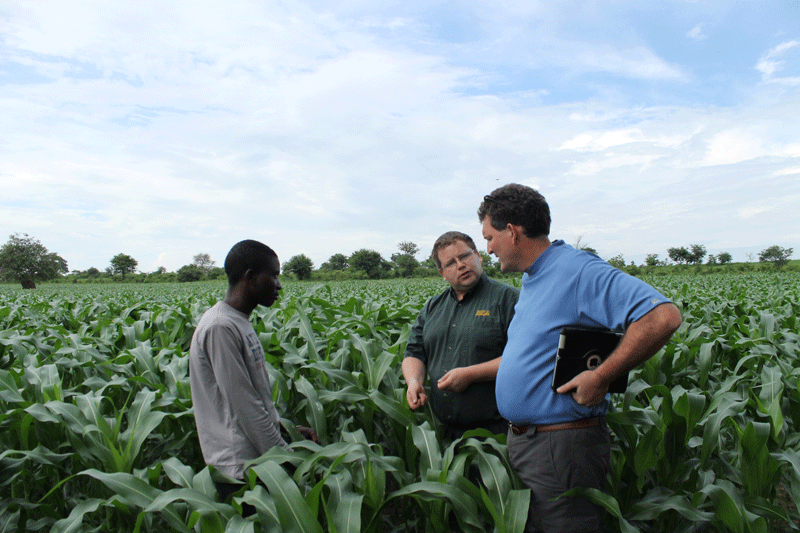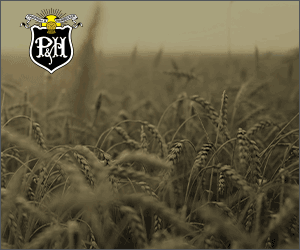One Seed
MAKING A DIFFERENCE IN ZAMBIA
AN ONTARIO AGRICULTURAL company is taking the knowledge and skills they provide to local farmers in southwestern Ontario and sharing it with farmers over 12,000 kilometres away in the African country of Zambia. Increasing yields for farmers there is life-changing given that Zambia ranks amongst the poorest countries on the Human Development Index and the average Zambian earns less than $1 per day.

South West Ag Partners, based in Chatham, is partnering with a team of students at Lambton College who are part of an international, non-profit student organization known as Enactus. Enactus works in collaboration with academic and business leaders and is committed to using the power of entrepreneurial action to transform lives and shape a better, more sustainable world through various projects in 39 counties. The Zambia project is called “One Seed” as it reflects the goal of sowing the seeds of change and improving the quality of life for families in Zambia through agriculture. South West Ag joined the Lambton Enactus project team last summer and has since made three trips to the village of Kasaka, where the project is centred.
EVALUATING THE PROJECT
The first trip in August was prior to planting and was intended to evaluate the landscape and help South West Ag determine their comfort level with the project.
“Enactus and the people of Kasaka convinced us this was a worthwhile project” says Paul Hazzard, South West Ag General Manager. “There was clearly an opportunity for our expertise to make a difference.”
In late November, Barry McFadden and Jim Hazzard of South West Ag, Lambton farmer Mark Lumley, and the Enactus team made their second trip, this time to educate and train the 138 farmers on the program and distribute seed, fertilizer, spray, and tools to plant their individual one hectare (roughly 2.5 acres) fields.
The third trip, taken by Agronomist Aaron Breimer and Marketing Representative Mike Eaton of South West Ag, was in January with the purpose of evaluating the progress of the project.
“There were a few isolated issues with some of the changes that were made to the traditional production system, but with so many variables involved in soil and weather that is pretty common in farming, especially when you have 138 one hectare farms involved. It is a learning process for us and for them, but the opportunity for improvement is enormous,” says Briemer.
In most cases, the farmers of Kasaka are seeing improved germination, higher populations, and better crop growth. Breimer notes how many of the farmers do not believe you when you tell them the potential yield that their fields may produce based on what we saw. “They are just so excited and appreciative.”
Their excitement is understandable when you consider that they were often producing five bushels per acre and are now seeing potential yields of 50 and even 100 bushels per acre. The higher yields will not only allow them to pay back the loans that were made to them through the project to plant their crops, but will also help pay for next year’s inputs and provide additional profits, which they have never seen before. Past crops have barely provided a food source for their family. “This project changes people’s lives,” says Jim Hazzard. “That’s why we are here with Enactus.”
A fourth visit to Kasaka was underway at press time. Harvest is in full swing and the results will be evaluated by the Enactus team. Early reports are showing a range of results depending on the level of uptake of the newer crop management practices. One important observation that the Enactus and South West Ag teams have made is that traditions do not change overnight, particularly in Africa where corn production is such a primitive practice. Some of the changes involved are so radical from what they are accustomed to that the farmers struggle to understand and fully adopt them, so it is a slow process of change.
COMMMITMENT TO DEVELOPMENT
South West Ag’s pathway to Zambia was as much a result of its company mission as it was strong customer relations. “We are committed to the development of our people and we believe that leadership and teamwork are fundamental requirements to the success of our company, and so we have regularly created and offered opportunities to our staff that will promote and strengthen those traits, at no charge to them,” says Paul Hazzard.
“We were fortunate enough to come across this opportunity with Enactus through a good farm customer of ours who was involved in the project, Mark Lumley. They were looking for agricultural expertise to improve corn production for farmers in the village of Kasaka, Zambia, and Mark brought it to us,” explains Hazzard. “There were so many things about this project that we liked: it did not create new infrastructure costs, it was a local partnership and therefore reliable and trustworthy, it delivered tangible and meaningful results, it was hands-on, and it was extremely impactful for the farmers and the families we were helping and for our staff. It has created a positive ‘buzz’ across our company that we could not have imagined.”
South West Ag has made a three-year commitment of time, money, and staff to the One Seed project. Persons or groups interested in learning more can contact Jim Hazzard (Jim.Hazzard@southwestag.ca) or Jon Milos (Jon.Milos@lambton college.ca).
About the author: Rick Youlton is the Marketing Manager, Fertilizer, for South West Ag Partners Inc. •








